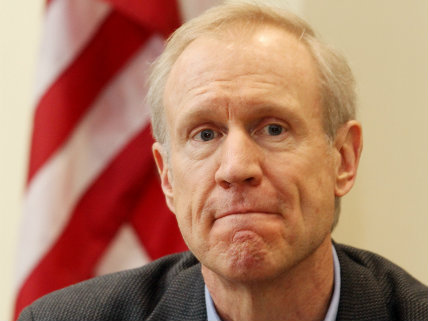2 Numbers That Show How Screwed Chicago's Pension Plans Are
Collecting $99 million and paying out $999 million in a single year is not a formula for success.

You don't need to be an expert in the dense, convoluted math unpinning public pension systems to understand why this is bad news.
During 2015, the two pension plans for Chicago city employees paid out $999 million in retirement benefits to 29,286 retirees. During that same year, the two funds generated just $90 million in investment income.
To call that a massive shortfall would be a, well, massive understatement.
Here's why it matters. Investment returns are one of three ways that money gets into public pension plans—the other two being contributions from public employees themselves and contributions from taxpayers. Contributions from employees are set at fixed levels based on contracts, so a shortfall in investment returns means that either taxpayers are picking up the tab or the pension fund is running in the red. In Chicago, both of those things are happening.
Chicago City Wire, which reported this week on those terrifying numbers for the city's two municipal worker pension systems, also notes that the four other pension plans in Chicago—covering teachers, firefighters, police, and park workers—are not doing much better. "All six operate as government-sanctioned Ponzi schemes, paying retirees with contributions made into the fund by active city employees, as well as taxpayers contributing on those employees behalf," the Chicago City Wire concludes.
Chicago officials have tossed around a wide range of ideas for how to squeeze more money out of the population in order to feed the ever-growing appetite of the city's pension systems. Taxing soda and other sugary drinks is one idea. Taxing sewage is another. None of those ideas will solve the pension crisis, and are likely to drive more people out of the city, which has already seen a drop in population for two years running.
With city-level options unworkable or unlikely to succeed, Chicago is looking for help from the state—but Illinois is dealing with the nation's worst state-level pension deficit too. A recent report from the Illinois Policy Institute identified a $286 billion deficit in retirement-related costs at the state level, including pensions and retiree health care costs.
Chicago finds itself in the current mess because the city has failed to adequately fund the cost of its municipal pension plan. Going back to at least 2006, Chicago has never come close to fully funding its annual pension obligation—in most years, it hasn't even put in half of what would be required to keep the fund stable.
Gov. Bruce Rauner this week vetoed a bill that would have allowed Chicago to contribute less to the city pension plans for a few years with the promise that higher contributions would be coming in later years. Rauner correctly called the bill an attempt to further "kick the can," and has offered a $215 million state bailout of Chicago's school pensions in exchange for statewide pension reforms to curb long-term retirement costs.
"We should include all pensions in that. It would save billions of dollars, and it's the right long-term solution." Rauner said this week, according to Illinois News Network. "These politicians have gotta learn that kicking the can and having pension payments go up only after their out of office; no more. Because taxpayers are always there and they're getting hurt by that process of kicking the can."
The pension crisis is a weight around the neck of Illinois, says Moody's, a credit ratings service, which issued a sobering assessment of the state's economy earlier this year. "Soft job creation and the state's descent into fiscal quicksand" are the results of a shrinking labor force and population, Moody's said. Fewer people in the state means fewer people to pay the growing pension bills, which already exceed $56,000 per household, according to the Illinois Policy Institute report.
"Pensions don't work and they never will," Diana Rickert, vice president of communications for the Illinois Policy Institute, told Reason on Thursday. "It's wrong to ask government workers to pay more money into a broken system, and it's wrong to keep soaking taxpayers when we know full well the system is on the verge of collapse."
In Chicago, Rickert says, all new workers should be put into a new retirement plan modeled after the 401(k) systems common in the private sector, effectively shutting down the public pension system as current works retire and eventually die.
That doesn't solve the immediate problem facing Chicago's and Illinois' public pension issues because it would not reduce the payments owed to current workers and retirees, but it would at least save taxpayers from having to pay even more in the long run. In the short term, though, all you need to know is that collecting $99 million and paying out $999 million in a single year is not a formula for success.


Show Comments (26)